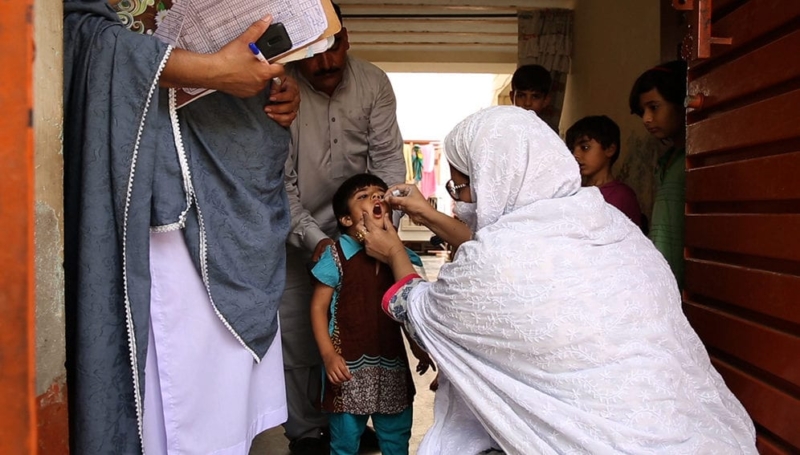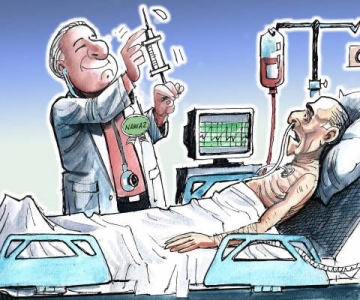The death of nine anti-Polio workers has come as a new low in the life of the Pakistani nation. Almost as if the country had lost its bearings and its society could not even determine its priorities. The Polio virus is a real threat to the future of Pakistani children and adults. While it has been eliminated in the neighbouring countries such as India and Bangladesh, Pakistan has witnessed the resurgence of the virus as well as a disturbing trend of refusals among the parents to vaccinate children. There is a complex set of factors at play. The extremists have unleashed a campaign, which considers the Polio vaccine as part of the ‘Western’ agenda to harm the Muslims of Pakistan. Last year’s CIA-sponsored fake vaccination campaigns to hunt bin Laden did not help this cause either. Polio vaccination was made controversial in the process. But all of this is not an excuse to deny Pakistani children their right to a safe and healthy future.
The United Nations is now worried about the security of its staff and the growing threats to their workers and volunteers who are undertaking door-to-door campaigns to achieve one hundred percent vaccination coverage of all children. The World Health Organisation, as reported in the media, might be winding up its work in the country. This is a moment of reckoning for the Pakistani authorities – its civilian government and the army leadership – which have to ensure that this country does not become hostage to the terror perpetrated by the extremists who have a warped view of the world.
The brutal killing of five people in Karachi and more in Peshawar and Nowshehra is a sad reminder of our crippled law enforcement machinery. The Police remains governed by a confusing legal and administrative arrangement. Whatever reform was initiated under Musharraf has been undone by the civilian governments in the provinces, which are keen to use the Police as an instrument of personal and political aggrandizement. The prosecution services are in shambles and no worthwhile investment has been made into them despite the massive threat of terrorism and worsening law and order across the country.
How can the courts decide on terrorism cases if there is unreliable and incomplete investigation and prosecution of a particular criminal case? Having said that the courts especially at the district level have not demonstrated much efficiency in deciding on terrorism cases. Sometimes they are afraid and on other occasions they face cases, which have little credible evidence for a sentence to be made.
To its credit the Prime Minister’s cell on Polio has been working tirelessly to coordinate subnational agencies involved in the process of managing services. This high level body has received immense support from the United Nations in the past. The government has involved the media, the clerics and a variety of stakeholders in the process. Yet, when it comes to security in provinces and districts the security challenge impedes progress.
The aid workers and anti-polio teams at the local level remain vulnerable and this casts a dark shadow over the future trajectory of the immunization campaign. Pakistan along with Afghanistan and Nigeria remains a high threat country. There are reports that Pakistanis’ travel abroad may become restricted in the months to come. What would this mean for a country, which has sent millions abroad to work and send remittances home?
Countless pundits and analysts are always ready to boast on how Pakistan is a viable and strong state as opposed to Afghanistan, which is a stateless country. It is time that they looked at the situation and changed their view. In our quest to ‘control’ Afghanistan and ‘control’ Indian influence we have damaged our own society and left millions of children vulnerable to a deadly virus.
While the Pakistani government and its civil society have shunned the killing of anti-polio workers, sadly many people in the country continue to apologise for the heinous crimes being committed by the terrorists. Each time there is a vile crime against civilians, a tirade of anti-US emotion is spun by sections of print and electronic media. This culture has also engulfed social media, which is becoming a new citadel for jihad promotion. After the recent spate of killings, the social media was abuzz with all sorts of rumours. Those who are soft on the Taliban and their affiliates endlessly cursed Dr Shakil Afridi – the alleged collaborator of the CIA – and the United States for causing the deaths of volunteers. Those who oppose the government and its allies say that it is the PPP, MQM and ANP who are responsible for this ugly terror attacks. Several others cite the components of vaccine as the cause for public mistrust and reaction by the extremists. There have been TV anchors who even conducted such shows not realizing the consequences of their search for transient ratings with the advertisers.
For instance, a right wing paper published from Karachi has been publishing reports with screaming headlines that monkey cells are used to prepare polio vaccine. According to this newspaper, in 2006 Mr Mohammed Nabi filed a petition in the Peshawar high court asking for a ban on polio vaccine because it contained female hormones. The paper also regurgitates half-truths and feeds anti-polio vaccine hysteria even when innocent lives of brave (and underpaid) and dedicated workers are lost due to this mindset.
Our national security doctrines are now recipes for further chaos and mayhem in the country. We have pandered to the extremists for too long to either gain short term political capital or execute projects of regional adventurism in Afghanistan and India. In this bargain the Pakistanis have lost. Our state firmly occupied by elites and their tunnel-vision, has forsaken human security and the need for an educated, healthy and employable citizenry. It has put the interest of a few institutions and agencies before everything else in the republic. Consequently we are a country of 200 million now without a clear future. Unlike other regional countries our middle classes are increasingly despondent and uncertain about the future. Despite the xenophobia inculcated by the education system, mosques and the media, a Pakistani youth would happily leave the country. Such is the irony of the national security-obsessed paradigm of governance.
Tackling the polio crisis in the short to medium term is a major challenge for the state. No matter which party rules Islamabad or provincial capitals, they have to deliver on this front. The politicians and the civil-military bureaucracy cannot afford to let the country slip into the hands of the out of control non-state actors that they once created.
The anti-Polio campaign therefore becomes a symbol of a larger struggle of reclaiming Pakistan from the forces of bigotry. Those who are in denial about the link between extremism, polio and a failing state should read all the decrees issued by the militant groups. According to Taliban, vaccinations comprise a Western plot to sterilize Muslim populations. Worse, we have also heard about fatwas of some clerics that those crippled by polio have a natural “martyr” status. When faced with this narrative, there is no option but to think of some immediate and long-term measures. In particular, there can be no viable immunization campaign without the inclusion of women workers and volunteers and arriving at a consensus in the society that our children need to be protected.
Sadly I will have to agree with Dr Omar Ali, a blogger who wrote a chilling post on the deaths of anti-polio workers (Brown Pundits, December 20, 2012) and concluded with these lines:
“Its worth noting that this is clearly not the work of one demented madman or even a few demented mad men. Its a movement. And they have ‘freedom of movement’ across the length and breadth of Pakistan. And they are getting much sympathy from fellow anti-imperialists and anti-globalization activists, who are providing them with new and better justifications via the internet. Ironically, another feature of globalization.”
This is the time to stand up and reject those who want to cripple our younger generations. Other than the physical health the insidious, violence justifying mindset needs to be fought by all segments of Pakistani society.
First published in The News on Sunday



